| Srl | Item |
| 1 |
ID:
086625
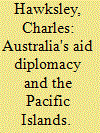

|
|
|
|
|
| Publication |
2009.
|
| Summary/Abstract |
Great powers seek to influence world affairs; middle powers seek to influence their regions. Australia's 'near abroad' includes Indonesia and the South Pacific, especially Melanesia. Elected Prime Minister in November 2007, Kevin Rudd has indicated a new direction for Australian policy in the Pacific and the previous image of a pushy or bullying Australia has to some extent been laid to rest. Yet the key differences between Rudd's policies and those of the former government of John Howard appear to be of style rather than substance. Despite the new rhetoric of greater engagement, the emphasis on market forces creating development shows an essential continuity of Australian foreign aid policy in the South Pacific.
|
|
|
|
|
|
|
|
|
|
|
|
|
|
|
|
| 2 |
ID:
086624
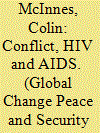

|
|
|
|
|
| Publication |
2009.
|
| Summary/Abstract |
The argument that there is a link between conflict and the spread of HIV has become commonplace in both the academic and policy world. This article examines five key reasons offered for this link: the high HIV prevalence in many militaries; that conflict leads to migration which acts as a vector for the spread of the disease; the changes in sexual behaviour introduced by conflict, including increased incidence of rape; reduced health provision and support as a result of conflict; and the risks introduced in post-conflict settings. The article argues that these reasons offer a poor explanation as to why HIV is spread in some conflicts but not others and develops a new model to explain when conflict might lead to the spread of HIV.
|
|
|
|
|
|
|
|
|
|
|
|
|
|
|
|
| 3 |
ID:
086622
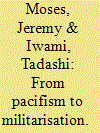

|
|
|
|
|
| Publication |
2009.
|
| Summary/Abstract |
The pacifist commitment contained in Article 9 of the Japanese constitution has long been a source of scholarly interest and debate. While the insertion of the clause in the post-Second World War constitution was originally justified by General MacArthur (amongst others) as an expression of the 'high ideals' of liberalism and democracy that Japan was now embracing, it has since been derided as an impediment to effective Japanese participation in wars fought by the United States that are claimed to be in defence of freedom and democracy. This reversal of liberal logic became evident in the early years of the Cold War as Japan was encouraged to support the US in the Korean War and has strengthened in the years since. From the first Gulf War of 1991, up to the current War on Terror, much has been made of the constraints that Japan faces in supporting the 'defence of freedom' on a global scale. This paper aims to show the place of liberal discourses in relation to the pacifist clause in order to highlight the great ambiguity and inconsistency that exists in liberal claims concerning the promotion of peace in international affairs. In the context of tensions over Taiwan and North Korea, as well as the potential for controversial 'humanitarian' roles for the Japanese military in the South Pacific, these normative questions aim to shed light on the potential dangers of Japanese remilitarisation on liberal-internationalist grounds.
|
|
|
|
|
|
|
|
|
|
|
|
|
|
|
|
| 4 |
ID:
086623
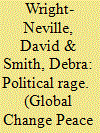

|
|
|
|
|
| Publication |
2009.
|
| Summary/Abstract |
Recently there has been a renewed interest in the role of emotion as both a site of political knowledge and as a contributing dynamic in the stability or upheaval of political institutions. While it is widely recognised that emotion is directly implicated in terrorist behaviour, terrorism studies has not critically engaged in this revitalised theorising. As a small step towards addressing this analytical gap we argue that there is a need to see terrorism as a political act grounded in a particular set of human emotions triggered in certain social circumstances. We begin with a brief discussion of the treatment of emotion within terrorism studies before examining how modernity might contribute to an intensification of emotion within political behaviour. We posit that one outcome of this intensification is the adoption of violent forms of political agency by individuals seeking to address real or perceived grievances.
|
|
|
|
|
|
|
|
|
|
|
|
|
|
|
|
| 5 |
ID:
086620
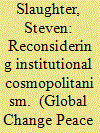

|
|
|
|
|
| Publication |
2009.
|
| Summary/Abstract |
Cosmopolitan scholarship has been at the forefront of efforts to consider political structures capable of realising justice in a more robust manner than prevailing global governance arrangements. In particular, the arguments of Thomas Pogge have contributed significantly to scholarly thinking about global poverty and his scheme of 'institutional cosmopolitanism' aspires to institutionalise human rights in the structures of global governance. This essay critiques the capacity of Pogge's cosmopolitan approach to productively guide political action in relation to global poverty by questioning whether global institutions generated by human rights are sufficient to address global poverty. The argument in this essay is that a viable guide to political action which alleviates global poverty must also take account of the potential utility of the state. This essays draws upon republican ideas to contend that cosmopolitanism needs to encompass a robust account of local institutions such as the state.
|
|
|
|
|
|
|
|
|
|
|
|
|
|
|
|
| 6 |
ID:
086619


|
|
|
|
|
| Publication |
2009.
|
| Summary/Abstract |
Several recent works have emphasised contemporary hierarchical trends within international society that suggest a transition away from international society's pluralist constitution. These trends have been most readily demonstrated by the willingness of dominant states, such as the United States, to conduct interventions in support of the promotion and enforcement of liberal democratic values. Yet while many scholars have identified these hierarchical trends, few have considered what such trends suggest regarding the underlying normative constitution of international society. This paper seeks to explain why such a transition within the normative constitution of international society has occurred. Utilising Ulrich Beck's notions of risk and the 'world risk society', this paper suggests that an increasing preoccupation with globalised security risks within international society, particularly on the part of the West, underpins this constitutional transition. The West's perceived need to manage global security risks via intervention in so-called 'risky zones' structures the new normative basis of international society. Risk has altered the constitutional structure of international society in a way that gives rise to various hierarchical and anti-pluralist trends.
|
|
|
|
|
|
|
|
|
|
|
|
|
|
|
|
| 7 |
ID:
086621
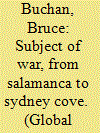

|
|
|
|
|
| Publication |
2009.
|
| Summary/Abstract |
Australia's colonisation by Britain (from 1788) was accomplished without the 'consent' of the Indigenous inhabitants, or the negotiation of any kind of treaty. The violence of the colonisers against the Indigenous inhabitants was never officially acknowledged to be a form of 'conquest' or 'war'. This was in part due to the fact that the Indigenous inhabitants of Australia were not regarded by the colonisers to be subjects against whom a war could be waged. Australia's early colonisation offers an example of the conceptual myopia in the development of European discourses of international relations. Within these discourses, warfare was seen as an increasingly disciplined form of violent engagement between the subjects of sovereign states. European thinkers thus came to see 'the subject' of war as a self-disciplined, rights-bearing individual inhabiting a civil space underwritten by relations of private property and guaranteed by the sovereign state. In this way, the subject of war was differentiated from the undisciplined violence of non-subjects - those in rebellion against their sovereign, or those who were without sovereignty altogether. By the eighteenth century, this constellation of concepts was framed by notions of civilisation which tied the subject of war to an historicised account of the difference between supposedly 'civilised' societies and so-called 'savage' peoples. In this paper I will argue that notions of civilisation are central to our understanding of the development of IR discourse.
|
|
|
|
|
|
|
|
|
|
|
|
|
|
|
|